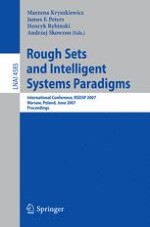2007 | OriginalPaper | Buchkapitel
Granulation of Knowledge in Decision Systems: The Approach Based on Rough Inclusions. The Method and Its Applications
verfasst von : Lech Polkowski
Erschienen in: Rough Sets and Intelligent Systems Paradigms
Verlag: Springer Berlin Heidelberg
Aktivieren Sie unsere intelligente Suche, um passende Fachinhalte oder Patente zu finden.
Wählen Sie Textabschnitte aus um mit Künstlicher Intelligenz passenden Patente zu finden. powered by
Markieren Sie Textabschnitte, um KI-gestützt weitere passende Inhalte zu finden. powered by
Rough set approach to knowledge entails its granulation: knowledge represented as a collection of classifications by means of indiscernibility of objects consists of indiscernibility classes that form elementary granules of knowledge. Granules of knowledge that emerge as unions of elementary granules are also characterized as exact concepts that are described with certainty. Relaxing of indiscernibility relations has led to various forms of similarity relations. In this lecture, we discuss the approach to similarity rooted in mereological theory of concepts, whose primitive notion is that of a rough inclusion. Rough inclusions are predicates/relations of a part to a degree. Partial containment is the basic underlying phenomenon related to uncertainty, therefore rough inclusions allow for a formalization of a wide spectrum of contexts in which reasoning under uncertainty is effected.
Granules are formed by means of rough inclusions as classes of objects close to a specified center of the granule to a given degree; formally, they resemble neighborhoods formed with respect to a certain metric. Classes of objects in turn are defined by the class operator borrowed from mereology. The usage of mereological techniques based on the notion of a part is justified by its greater elegance and transparency in comparison to the naive theory of concepts based on the notion of an element.
At IEEE GrC 2005, 2006 the Author put forth the idea of a granular information/decision system whose objects are granules formed from the original information/decision system; the idea was issued along with the hypothesis that granular systems at sufficiently large radii of granulation, should preserve information about objects coded in the attribute–value language to a sufficiently high degree. This idea is here discussed along with results of some tests that bear it out.
The second application that is reflected in the lecture is about missing values; the approach discussed here is also based on granulation and the idea is to absorb objects with missing values into granules of knowledge in order to replace in a sense the missing value with a defined one decided by the granule.
